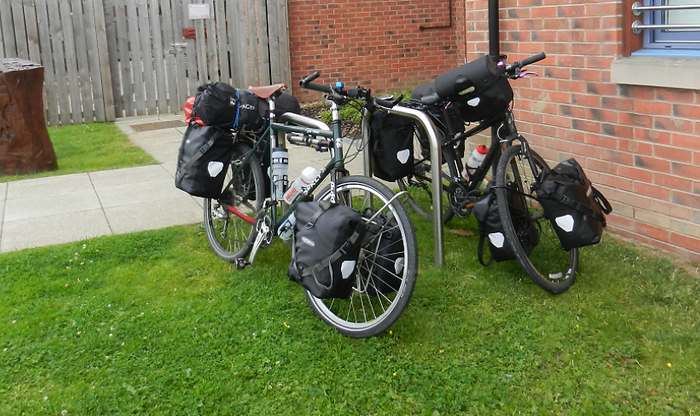I want to make sure that you have everything you need for your cycling tour of Switzerland. At the same time, knowing how quickly your gear can add up in terms of weight means you have to be very judicious in choosing the right gear for your trip. The key to packing well for a trip like this is to balance between what you need and the weight it will add. Remember, you will be taking your gear with you and any added weight means more work for you to haul that weight around during your trip.

Quick discussion that will impact what you choose to bring
Before I get into the details about what you should pack, here are some things to consider about the trip which will impact your decision for choosing what to pack.
For anyone experienced in loading your bike with extra weight, you know the first few kilometers are great. They seem to fly by with ease. By the middle of your day of riding, it becomes a bit more challenging. The ease of riding in the beginning of the day is slowly slipping away and now you need to put more effort into each pedal stroke. By the end of the day, you’re likely lagging in energy and may even be to the point of exhaustion. By adding unnecessary weight to your bike, you will reach the last stage of drained energy and tiredness much faster. Even if you have a good nights sleep, your body will still be recovering from the ride from the day before. Now, youre a little more tired starting off day 2 of your journey. Stage 2 (riding is becoming a bit of a challenge and less easy) and stage 3 (tired and lagging in energy) come a little faster each day you ride because your body is trying to recover from the previous days ride. This is a reality of a multi-day cycling tour.
Whether you’re an seasoned veteran of cycling road trips or this is your first time riding, you will experience the phenomenon. You will have great riding days and not so great days. And there are a number of factors which play into how you feel each day of riding. Here’s some of them:
- How well you slept the night before
Did you have a good nights sleep or was it a poor nights sleep? - The distance you rode the day before
Was your previous days riding short, long but with a lot of rest stops or was it a long ride with few rests? - The profile of your ride from the previous day.
Was the terrain you rode on hilly, flat, or a combination of both? - Road surface
Anyone who has ridden on unpaved shoulders or on rough roads knows how much extra work this takes. It can be incredibly draining if the roads are rough versus a nicely paved and maintained road. - The weather
You could have the most gorgeous stretch of road in front of you but if you have heavy head winds or cross winds, you will be working a lot harder to get to your destination. Rain can be wonderfully refreshing on a tour if the temperature is warm and the rain is light. A driving rain in cold temperatures can be exhausting. While we all plan the perfect trip with sunny days and no problems, reality is that the weather is unpredictable and you may have challenging weather conditions to deal with. You will need to pack cycling gear to deal with wet weather, windy days and bright sunny ones. This is a big consideration when packing for your tour.
Now lets talk about what to pack
I’m thinking that the best way to outline this discussion is by category. For example, Im going to write about what to pack in terms of food, clothing, tools, medical supplies etc. I was going to put this all into 1 post but I think I will break each of these into a separate post so I can explain why each of these are important and what might be optional choices depending on what type of cycling tour you’re going on. If you are going to be camping, you will need different supplies than if youre going to be staying in hostels or hotels. I hope that by explaining in more depth the reasons for bringing certain items that it will help you make the best choice you can make about your own trip.
So, off I go to figure out all these categories and try to be an encompassing as possible.
